Related Research Articles

Liberia, officially the Republic of Liberia, is a country on the West African coast. It is bordered by Sierra Leone to its northwest, Guinea to its north, Ivory Coast to its east, and the Atlantic Ocean to its south and southwest. It has a population of around 5.5 million and covers an area of 43,000 square miles (111,369 km2). The official language is English. Over 20 indigenous languages are spoken, reflecting the country's ethnic and cultural diversity. The capital and largest city is Monrovia.

Liberia is a country in West Africa founded by free people of color from the United States. The emigration of African Americans, both freeborn and recently emancipated, was funded and organized by the American Colonization Society (ACS). The mortality rate of these settlers was the highest among settlements reported with modern recordkeeping. Of the 4,571 emigrants who arrived in Liberia between 1820 and 1843, only 1,819 survived (39.8%).

The Politics of Liberia takes place in a framework of a presidential representative democratic republic modeled on the government of the United States, whereby the president is the head of state and head of government; unlike the United States, however, Liberia is a unitary state as opposed to a federation and has a pluriform multi-party system rather than the two-party system that characterizes US politics. Executive power is exercised by the government. Legislative power is vested in both the government and the two chambers of the legislature.
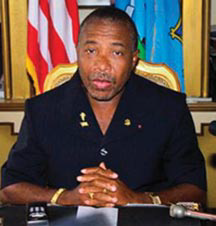
Charles McArthur Ghankay Taylor is a Liberian former politician and convicted war criminal who served as the 22nd president of Liberia from 2 August 1997 until his resignation on 11 August 2003 as a result of the Second Liberian Civil War and growing international pressure.
The Krahn are an ethnic group of Liberia and Ivory Coast. This group belongs to the Kru language family and its people are sometimes referred to as the Wee, Guéré, Sapo, or Wobe. It is likely that Western contact with the Kru language is the primary reason for the development of these different names.

Prince Yormie Johnson is a Liberian politician and former warlord who has served as a senator for Nimba County since 2006. A former rebel leader, Johnson played a prominent role in the First Liberian Civil War.
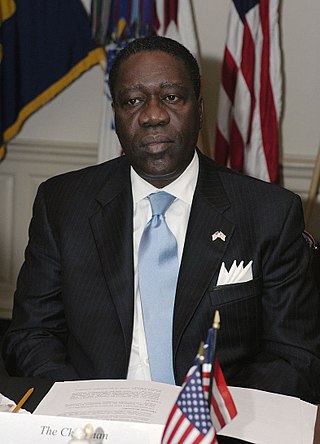
Charles Gyude Bryant was a Liberian politician and businessman. He served as the Chairman of the Transitional Government of Liberia from 14 October 2003 to 16 January 2006. The installation of the transitional government was part of the peace agreement to end the country's second civil war, which had raged since the Liberians United for Reconciliation and Democracy (LURD) rebelled against President Charles Taylor in 1999. Bryant was previously a businessman and was chosen as chairman because he was seen as politically neutral and therefore acceptable to each of the warring factions, which included LURD, the Movement for Democracy in Liberia (MODEL), and loyalists of former President Taylor. He was a prominent member of the Episcopal Church of Liberia, and was critical of the governments of Samuel Doe (1980–90) and Taylor (1997–2003).

The Liberians United for Reconciliation and Democracy (LURD) was a rebel group in Liberia that was active from 1999 until the resignation of Charles Taylor ended the Second Liberian Civil War in 2003. While the group formally dissolved after the war, the interpersonal linkages of the civil war era remain a key force in internal Liberian politics.
Monie Ralph Captan is the former foreign minister of Liberia from 1996 until 2003, former of Presidential Affairs 1996. During most of that time he served under President Charles Taylor. Captan's mother was a native of Liberia and his father was Lebanese. Before serving as foreign minister, he was a local businessman, owner of an independent Liberian newspaper and a professor at the University of Liberia. During the Liberian Civil War, his newspaper expressed views which sometimes came across as being sympathetic to Charles Taylor and his National Patriot Front of Liberia (NPFL). When Taylor won the elections, he was subsequently named foreign minister. He is one of several Liberian elites who were not members of Taylor's NPFL to be appointed to high level positions. During the Liberian Civil war he resided in Monrovia which was never controlled by the NPFL. Currently, Executive Chairman Comium Liberia. Captan who was overwhelmingly elected with over 70% of the votes on March 16, 2010 as President of the Liberia Chamber of Commerce.

The First Liberian Civil War was the first of two civil wars within the West African nation of Liberia which lasted between 1989 and 1997. President Samuel Doe's regime of totalitarianism and widespread corruption led to calls for withdrawal of the support of the United States, by the late 1980s. The National Patriotic Front of Liberia (NPFL) led by Charles Taylor invaded Liberia from the Ivory Coast to overthrow Doe in December 1989 and gained control over most of the country within a year. Doe was captured and executed by the Independent National Patriotic Front of Liberia (INPFL), a splinter faction of the NPFL led by Prince Johnson, in September 1990. The NPFL and INPFL fought each other for control of the capital city, Monrovia and against the Armed Forces of Liberia and pro-Doe United Liberation Movement of Liberia for Democracy. Peace negotiations and foreign involvement led to a ceasefire in 1995 but fighting continued until a peace agreement between the main factions occurred in August 1996. Taylor was elected President of Liberia following the 1997 Liberian general election and entered office in August of the same year.
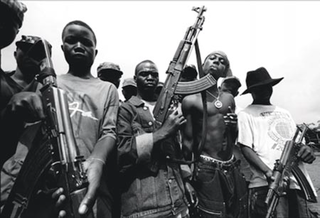
The Second Liberian Civil War was a civil war in the West African nation of Liberia that lasted from 1999 to 2003.

General elections were held in Liberia on 19 July 1997 as part of the 1996 peace agreement ending the First Liberian Civil War. The presidency, as well as all seats in the House of Representatives and the Senate were up for election. Voter turnout was around 89%. Former rebel leader Charles Taylor and his National Patriotic Party (NPP) won the election with 75.3% of the vote, giving it about three-quarters of the legislative seats according to the proportional representation system. Taylor was inaugurated as president on 2 August 1997.
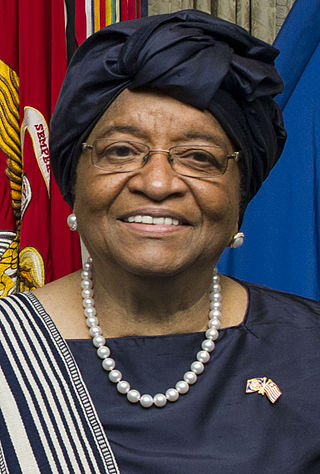
Ellen Johnson Sirleaf is a Liberian politician who served as the 24th president of Liberia from 2006 to 2018. Sirleaf was the first elected female head of state in Africa.

The United Nations Mission in Liberia (UNMIL) was a United Nations peacekeeping operation established in September 2003 to monitor a ceasefire agreement in Liberia following the resignation of President Charles Taylor and the conclusion of the Second Liberian Civil War (1999–2003). At its peak it consisted of up to 15,000 UN military personnel and 1,115 police officers, along with civilian political advisors and aid workers.
Armah Zolu Jallah is a Liberian politician and member of the National Patriotic Party (NPP). Senator Armah Zolu Jallah replaced Cllr. Eddington Varmah in the Senate in 1998 as Senator of Lofa County in a by-election he won by about 70%. The creation of Gbarpolu was the result of a pledge he made in the by-election to replace Eddington Varmah. He mobilized the people of Gbarma and Bopolu Statutory Districts for this purpose. He attended both the Gbarma and Bopolu meetings that initiated plans for the creation of Gbarpolu County during the Taylor administration.

The National Transitional Legislative Assembly (NTLA) was Liberia's legislative body during the country's transition from civil war to democratic rule.
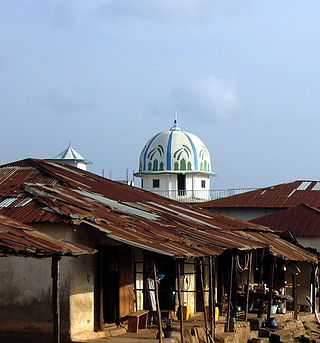
Islam in Liberia is practiced by an estimated 12.2% of the population. The vast majority of Liberian Muslims are Malikite Sunni, with sizeable Shia and Ahmadiyya minorities. The primary Muslim ethnic groups are the Vai and Mandingo but also Gbandi, Kpelle and other ethnic groups. Historically, Liberian Muslims have followed a relaxed and liberal form of Islam that is heavily influenced by indigenous religions that were integrated into Islam when it came to Liberia in the 16th century with the collapse of the Songhai Empire in Mali. Islamic religious practices vary in cities and towns across the country. Younger Liberian Muslims, particularly in the cities along the coast, tend to be more secular but still practice Islam in everyday life. In rural areas, Liberian Muslims are more conservative in dressing modestly, performing prayers and attending religious studies. The practice of Islam in Liberia has been compared to Islam common in Senegal and Gambia, with strong orientation toward Sufism.
Varmah Kpoto is a Liberian footballer who was capped 40 times for the Liberia national football team.

Liberia – United States relations are bilateral relations between Liberia and the United States. The two countries shared a close relationship until the 1970s.

Sie-A-Nyene Gyapay Yuoh is a Liberian judge and politician who currently serves as chief justice of the Supreme Court of Liberia and was nominated on August 23, 2022. She began to serve after the retirement of former chief justice Francis Korkpor on September 27, 2022.
References
- ↑ "Spying charges against TV crew in Liberia". New Zealand Herald . 21 August 2000. Retrieved 1 November 2010.
- ↑ "LURD Leader Dweh Chosen As Speaker..." AllAfrica.com . 20 October 2003. Retrieved 1 November 2010.